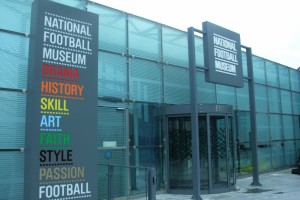
150 years after Ebenezer Morley and alumni of several elite schools founded the Football Association at the Freemasons’ Tavern in Great Queen Street, London, the Football 150 academic conference celebrates this historic anniversary. The gathering of soccerati takes place on 2-4 September at the National Football Museum in Manchester, UK. It is a joint project of the NFM, International Football Institute (University of Central Lancashire), and International Centre for Sports History and Culture (De Montfort University). The conference’s stated aims are “to reflect on the history of the Football Association and develop a blueprint for the future of the game and its study.”
Keynote speakers include historians Tony Mason, author David Goldblatt, and UEFA Executive Committee member Karen Espelund. A rich program features panels on the game’s global history, art, fan cultures and identities, migration, governance, media, and its broader social, political, and economic implications. The Arab Football Forum 2013 on Wednesday, September 4, will grapple with the potential impact of Qatar 2022 on MENA countries, the political role of football in the wake of the Arab spring, and women’s football.
My paper is part of a larger ongoing project on the history of South Africa’s hosting of the 2010 World Cup. Drawing from my digital archive of thousands of news items about the World Cup accumulated over nearly a decade, as well as government documents, published reports, oral testimony, personal observations, as well as the scholarly literature, the study argues that SA2010 reveals a paradox. On the one hand, South Africa’s image and influence in global football reached unprecedented heights thanks to the successful hosting of the tournament. But on the other hand, the overall social health of the local game (excepting a handful of elite clubs) suffered, particularly at the amateur, school, and youth level. In a small way, this paper addresses the lack of academic histories of World Cup tournaments and aims to generate discussion about the complex political, economic and cultural dynamics of football, particularly as they relate to South Africa, Africa, and more broadly to the Global South. (For more details on the topic, see my new co-edited book, with Chris Bolsmann, Africa’s World Cup.)
On my way to Manchester, it seems fitting to meet David Kilpatrick at the Freemasons Arms in London, “the spiritual home of the FA.” After a suitably English dining experience (whatever that means and entails), we’ll make our pilgrimage to the Emirates Stadium for my first North London derby!
Track conference proceedings via Twitter with the #Football150 hashtag and follow these participants: @DrDKilpatrick @ChrisBolsmann @SoccerHistoryUS @JeanMWilliams @FromaLeftWing @Davidsgoldblatt @MattLMcDowell @collinstony @mideastsoccer @j_richo1990 @GaryJamesWriter @StaceyPope20 @ShelleyBBC @ffion_ @mateobrown @DavidChilds @futbolprof